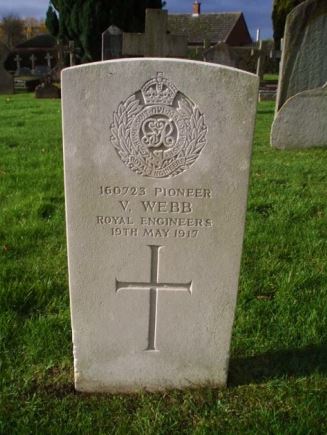Railway Transport Depot, Royal Engineers

It is fortunate that at least part of Valentine Webb’s Service and Pension Records has survived as information from other sources, such as the CWGC Register, Soldiers Died in the Great War and local newspapers is either sparse or non-existent. However, the census records are a useful source.
His full name appears to have been Valentine Ward Webb and he was born in Cheltenham in 1878. He appears in the 1881 and 1891 Census returns as living with persons other than his parents. By the time of the 1901 Census he was living at 10 King Street Gardens, Cheltenham along with Amelia, described as his wife and a daughter of four months, called Alice. Webb’s occupation was stated to be as a labourer. It would appear that Valentine and Amelia, unusually for the time, were living as man and wife but not legally married. Evidence for this is contained in Valentine’s Pension Record, which states that he married Amelia Sarah Hall at St Paul’s Church, Cheltenham on 4 August 1902. When listing his dependant children the word ‘illegitimate’ is noted alongside Alice’s name. The couple went on to have a further six children (one was to die in infancy) and the second was born in the last quarter of 1902, which implies that the couple married shortly before the birth. The 1911 Census shows the family living at 24 Rutland Street, Cheltenham. Valentine was still a general labourer (employed by Cheltenham Corporation).
On 3 August 1915 Valentine attested for Military Service, in Cheltenham, for the duration of the war and was posted as Private 23865, to the 11th Battalion, Gloucestershire Regiment, joining them at Belhus Park, Grays, Essex. His Attestation papers showed his address as 58 Rutland Street, Cheltenham. His time with the Glosters was not without incident. Whilst the battalion was based at Seaford, Sussex in November 1915 he went absent without leave from 11pm on the 17th until 10.30pm on the 23rd, when he was apprehended by the Military Police. Punishment was 14 days confined to barracks and the loss of 21 days’ pay. On 21 December 1915 he was absent from a parade and received a further five days confinement to barracks.
Questions arose as to his fitness and suitability as a soldier and a medical board heard how he had been suffering from an acute heart condition, dating back to 1913 and he had also suffered from rheumatism and pleurisy. Two weeks after joining the Army he had reported sick and had been put on light duties. The Army had sought to discharge him but were persuaded to allow him further time on light duty but after a fortnight he was found incapable of doing any duty and it was recommended that he be discharged as unfit for service in A, B or C categories and unlikely to be inside six months. The condition was not seen as being related to Army service and he was not considered as totally incapacitated from earning a living. He was discharged as ‘not likely to become an efficient soldier (on medical grounds)’ on 26 January 1916.
Having been dismissed from the Army, three months later Valentine was trying to get back in! On 4 April 1916 he signed Attestation papers at Cheltenham to join the 30th Gloucestershire Railway Labourers Battalion. In the section enquiring as to previous military service he made no mention of his time with the 11th Glosters and presumably he passed the medical! He was allocated the service number 160723 and the rank of Pioneer. The period 4 April to 16 May 1916 was spent in the UK before he was posted to the BEF in France and Flanders. He served abroad until 9 September 1916 and upon his return to the UK he joined the Royal Engineers Railway Transport Depot at Longmoor, near Liphook in Hampshire.
It is likely that his cardiac problems had surfaced again whilst he was on active service and on 24 November 1916 a medical board decided that he should be discharged from the Army once again due to his heart condition. This was seen as not being caused by military service but having been aggravated by active service, cold, wet and exposure. He was now considered quite unable to do any work and therefore totally incapacitated. His discharge, on the grounds of being ‘no longer physically fit for war service’, occurred on 15 December 1916. His conduct during this period of service was evidently satisfactory.
Valentine Webb has a Medal Rolls Index Card, which notes his service with the Royal Engineers and there is no mention of his time with 11th Glosters.
He died at Cheltenham on 19 May 1917, aged 39, from a cerebral haemorrhage, which was considered connected to his active service. His burial in Cheltenham Cemetery took place on 26 May and his grave is now marked with a CWGC headstone. He is commemorated on the War Memorial at St Paul’s Church.
Researched by Graham Adams 14 February 2013 (revised 10 August 2021)
